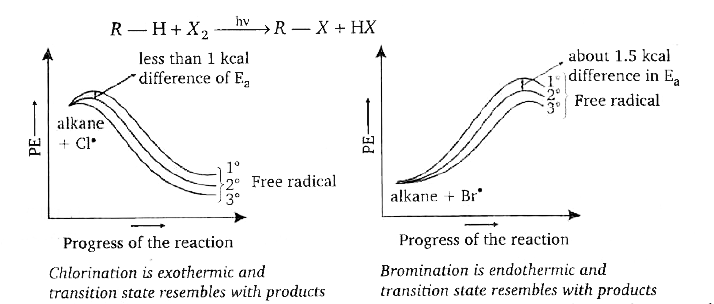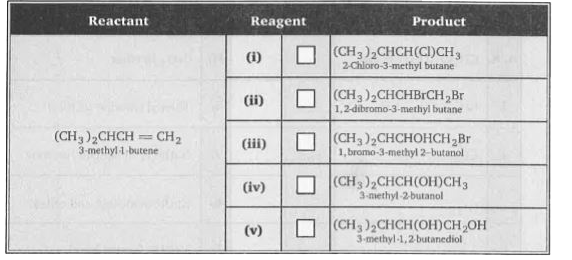CH3−CH2−CH2−CH2−Fabcd
Arrange the hydrogens a, b, c, d, in decreasing order of their reactivities towards chlorination : Solution in Kannada
a>b>c>d
b>c>d>a
b>c>a>d
c>b>a>d
The correct Answer is:C
Selectivity of Cl→3∘>2∘>1∘ hydrogen. as well as -I of F-atom.
Topper's Solved these Questions
- HYDROCARBONS (ALKANES) BOOK - MS CHOUHANCHAPTER - HYDROCARBONS (ALKANES) EXERCISE - LEVEL - 2 (1. COMPREHENSION)
3 Videos
- HYDROCARBONS (ALKANES) BOOK - MS CHOUHANCHAPTER - HYDROCARBONS (ALKANES) EXERCISE - LEVEL - 2 (2. COMPREHENSION)
7 Videos
- GRIGNARD REAGENTBOOK - MS CHOUHANCHAPTER - GRIGNARD REAGENTEXERCISE - Level-2 (Subjective Problems)
6 Videos
- HYDROCARBONS (ALKENES)BOOK - MS CHOUHANCHAPTER - HYDROCARBONS (ALKENES)EXERCISE - LEVEL-2
22 Videos
Similar Questions
For the given question (1, 2, 3), consider the following reaction.
 monohalogenation product
monohalogenation product
Light in involved in which step of the reaction :
View SolutionHalogenation is a substitution reaction, where halogen replaces one or more hydrogens of hydrocarbon.

Chlorine free radical make 1∘,2∘,3∘ radicals with almost equal ease, whereas bromine free radicals have a clear preference for the formation of tertiary free radicals. So, bromine is less reactive, and more slective whereas chlorine is less selective and more reactive.
The relative rate of abstraction of hydrogen by Br is
3∘>2∘>1∘(1600)(82)(1)
The relative rate of abstraction of hydrogen by Cl is
3∘>2∘>1∘(5)(3.8)(1)
1-halo-2, 3-dimethyl butane will be obtained in better yields, if halogen is :
View Solution
How many geometrical isomer of (X) is possible ?
View Solution
In each reagent box write a letter designating the best reagent and condition selected from the above list of reagents.

View Solutionunderset(a)(CH_(3))-underset(b)(CH_(2))-underset(c)(CH_(2))-underset(d)(CH_(2))-F Arrange the hydrogens a, b, c, d, in decreasing order of their reactivities towards chlorination:
View SolutionRank the following in decreasing order of basic strenth is : (A) CH_(3)-CH_(2)-C-=C^(-) (B) CH_(3)-CH_(2)-S^(-) (C) CH_(3)0-CH_(2)-CO_(2)^(-) (D) CH_(3)-CH_(2)-O^(-)
View SolutionDifferent hydrogen in overset(A)CH_(3)CH=overset(B)CH-overset(C)CH_(2)-overset(D)CH_(2)-overset(E)CHoverset(F)((CH_(3))_(2) are repesented by alphabets. Arrage them in decreasing order of reactivity towards radical substitution.
View SolutionArrange the following compounds in decreasing order of acidity :
CH3CH2OH
H2C=CH2
View SolutionArrange the following in order of decreasing reactivity towards SN2 reactions:
CH3CH2CH2Cl(I),CH3CH2−CHCl−CH3(II)(CH3)2CHCH2Cl(III),(CH3)3C−Cl(IV)
View Solution(i) Arrange the following in order of their increasing boling point. H_(2)O,OH^(-),CH_(3)OH,CH_(3)O^(-) (ii) Arrange the following in order of their increasing boiling point : n-butane, ethanol, water, propane. (iii) Arrange the following in order of their increasing boiling point : n-butan, n-butanol,n-butyl chloride,isobutane. (iv) Arrange the primary, secondary and tertiary alcohols into decreasing order of reactivity towards sodium. (v) Arrange the primary, secondary and tertiary alcohols into decreasing order of acidity . (vi) Arrange the following in order of their decreasing boiling point : pentan-1-ol,2-methyl butan-2-ol,3-methyl butan-2-ol. (vii) Arrange the following in decreasing order of rate of dehydration with conc. H_(2)SO_(2) : CH_(3)CH_(2)CH(OH)CH_(2)CH_(2)CH_(3)(A) (CH_(3))_(2)C(OH)CH_(2)CH_(2)CH_(3)(B) (CH_(3))_(2)C(OH)CH(CH_(3))_(2)( C) CH_(3)CH_(2)CH(OH)CH(CH_(3))_(2)(D) CH_(3)CH_(2)CH_(2)CH_(2)CH_(2)CH_(2)CH_(2)(E )
View SolutionArrange the following in correct order of reactivity towards Cl2/hυ
(A) CH4 (B) CH3CH3
(C ) CH3CH2CH3
(D) CH3−CH3∣CH−CH3
View SolutionThe order of reactivity of following alcohols with halogen acids is _____ (A). CH_(3)CH_(2)-CH_(2)-OH (B). CH_(3)CH_(2)-underset(CH_(3))underset(|)(C)H-OH (C). CH_(3)CH_(2)-underset(CH_(3))underset(|)overset(CH_(3))overset(|)(C)-OH
View SolutionThe heteroatoms present in CH_(3) - CH_2) - O - CH_(2) - CH_(2) Cl are a) Oxygen b) Carbon c) Hydrogen d) Chlorine
View SolutionArrange the following compound in decreasing order of their basicity.
(a)H2C=CHNa (b)CH3CH2Na
(c)CH3CH2ONa (d)HC≡CNa
View SolutionCH_(3)-underset((a))(C)-=C-CH_(2)-CHunderset((b))(=)CH_(2) Reactivity toward electrophilic addition reaction.
View SolutionWhich of the following is most reactive towards \(CH_{3}ONa\)
(A) \(CH_{3}COOC_{2}H_{5}\)
(B) \(CH_{3}COCl\)
(C) \(CH_{3}CONH_{2}\)
(D) \(CH_{3}COOCOCH_{3}\)
View Solution
